INTERIGHTS' Latest News section provides recent information on some of the major activities and work that we as an organisation are engaged in.
African Commission Requests Stay of Execution in Taba Bombings Case
African Commission Declares Case on Assault and Sexual Harassment of Female Protestors Admissible
Inauguration of the Judges of the New African Court on Human and Peoples' Rights
(Click here for details of earlier Programme Activities)
Judgment on Termination of Special Occupancy Rights
Serbia and Montenegro Lawyers Training on the European Convention on Human Rights
(Click here for details of earlier Programme Activities)
Pacific Judges Affirm Justiciability of Economic, Social and Cultural Rights
(Click here for details of earlier Programme Activities)
European Court Declares Polish Abortion Case Admissible
Uganda Training on Litigating Violence Against Women
Release of Egyptian Scholar Detained on Religious Grounds
(Click here for details of earlier Programme Activities)
Security and the Rule of Law
Landmark ruling by UK House of Lords on extra-territorial applicability of human rights law.
UK House of Lords Upholds State Immunity for Torture
Sri Lankan Ruling Undermines UN Complaints Mechanism
Forthcoming Casebook on Economic, Social and Cultural Rights in South Asia
(Click here for details of earlier Programme Activities)
African Commission declares case on assault and sexual harassment of female protestors admissible
London, December 8 - Following a contested hearing, the African Commission on Human and Peoples’ Rights recently declared admissible a case arising out of the assault and sexual harassment of demonstrators and journalists at a protest in Cairo in May 2005. The attacks took place in the presence of police, who failed to intervene to protect the women.
Acting on behalf of four female victims, INTERIGHTS, the International Centre for the Legal Protection of Human Rights, together with the Egyptian Initiative for Personal Rights submits that the Egyptian authorities had a positive obligation to prevent the attacks and to effectively investigate and prosecute the perpetrators. More specifically the case – the first of its kind before the Commission – draws attention to the use of sexual violence targeting women during the demonstrations, and the failure to prosecute such conduct under domestic criminal law.
The case should now be heard on its merits at the Commission’s next session in May 2007.
For more information:
David Geer
Executive Director
+44 (0) 20 7843 0485
Andrea Coomber
Acting Legal Director
Sri Lankan Ruling Undermines UN Complaints Mechanism
In a regrettable ruling handed down on 15 September 2006 the Sri Lankan Supreme Court has struck a blow against those human rights victims in Sri Lanka expecting to obtain redress through the UN Human Rights Committee (HRC) for breaches of the International Covenant on Civil and Political Rights (ICCPR). The Supreme Court held that the Sri Lankan state’s accession to the Optional Protocol to the ICCPR – which allows individuals to complain directly to the HRC having exhausted domestic remedies – was unconstitutional. This is despite the fact that the complaints mechanism under the Optional Protocol to the ICCPR has been in force in Sri Lanka for nearly a decade, and that by ratifying the ICCPR the State has undertaken to ensure respect for those rights protected by it.
For more information read the full press release
Inauguration of Judges of the New African Court on Human and Peoples' Rights (top)
All 11 new judges to the newly established African Court on Human and Peoples’ Rights were sworn in at the 7th African Union Summit in Banjul, The Gambia on 2 July 2006. The inauguration was an important step in the long-awaited establishment of the Court, which faced delays following the 2004 African Union decision to merge the new African Human Rights Court with the Court of Justice of the African Union. The judges were elected by the African Union Executive Council of Ministers in Khartoum, Sudan on 21 January 2006. They are: Mr. Fatsah Ouguergouz (Algeria), Mr. Jean Emile Somda (Burkina Faso), Mr. Gerard Niyungeko (Burundi), Ms Sophia Akuffo (Ghana), Mrs. Kelello Justina Masafo-Guni (Lesotho), Mr. Hamdi Faraj Fanoush (Libya), Mr. Modibo Tounty Guindo (Mali), Mr. Jean Mutsinzi (Rwanda), Mr. El Hadji Guisse (Sénégal), Mr. Bernard Ngoepe (South Africa), and Mr. G Kanyiehamba (Uganda).
Following the inauguration ceremony, the new judges held discussions with members of the African Commission on Human and Peoples’ Rights, members of the African Committee on the Rights and Welfare of the Child, members of the ECOWAS Court of Justice and the SADC Tribunal, as well as civil society representatives including members of the Coalition for an Effective African Court.
Tanzania was confirmed as the seat of the new Court, at the current site of the International Criminal Tribunal for Rwanda in Arusha. Arrangements are currently being made for a preparatory visit to the site by the Commission of the African Union and the Bureau of the Court to draft a formal agreement on the seat of the Court with the Government of Tanzania. An initial budget for the Court was set at US $2, 250,000.
�The new draft Protocol on the merged Court of Human and Peoples’ Rights with the Court of Justice of the African Union has not yet been adopted, pending further amendments at the request of the governments of Zimbabwe, South Africa, Swaziland, and Ghana. A further meeting of Ministers of Justice will be convened later in the year in order to examine the critical issue of equal gender and geographical representation in the Court, transitional provisions, and the question of state reservations to the Protocol. The revised draft will then be submitted to the AU Summit for further consideration in January 2007 in Addis Ababa.
INTERIGHTS assisted in drafting the new merged Protocol, and is a member of the Coalition for an Effective African Court. The draft Protocol on the merged Court is available here from INTERIGHTS.
For more information please contact:
Ibrahima Kane
Senior Legal Officer
Africa Programme
Email: ikane@interights.org
Seminar for Central African States on Ratification of the Protocol to the African Court (top)
Libreville ( Gabon) 6-7 June 2006
INTERIGHTS recently organised a two-day seminar in collaboration with the African Union, and with the assistance of the Gabon government, in order to inform states of the process of ratification of the Protocol on the African Court of Human and Peoples’ Rights, and to encourage them to ratify as soon as possible while also making a declaration under Article 34(6) enabling individuals and non-state actors access to the new Court. To date only three Central African states have ratified the Protocol – Gabon, Burundi, and Rwanda.
The seminar was the last of a series of three sub-regional meetings intended to accelerate the ratification of the Protocol by member states of the African Union (AU). It was attended by states representatives, regional and sub-regional judicial or quasi-judicial bodies, national human rights iInstitutions and NGOs from the Central African region. Representatives from the governments of Burundi, Cameroon, Central African Republic, Congo, Democratic Republic of Congo (DRC), Gabon, and São Tome & Principé, the Commission of the African Union, the African Commission on Human and Peoples’ Rights, the Economic Community of Central African States, and the Court of Justice of the Economic and Monetary Community of Central Africa (CEMAC) also attended.
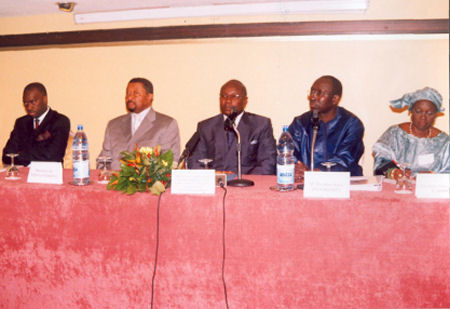 |
From left to right: Ambassador Nelson Cosme, CEEAC; the Minister of Foreign Affairs, Gabon; His Excellence M. Pierre Claver Mananga, Minister of Human Rights, Gabon; Ibrahima Kane, Senior Lawyer, INTERIGHTS; and Mme. Reine Alapini-Gansou, Commissioner with the African Commission |
The seminar examined various issues concerning the human rights court, notably the history of its creation, the processes and consequences of ratification at a national level, the relationship between the human rights court and the Court of Justice of CEMAC, as well as constraints and obstacles to ratification and ways to overcome these problems. In the Final Communiqué which was adopted, participants identified various constraints at the national level including, inter alia, the lengthy internal procedures for ratification, the lack of coordination between Ministerial departments, the lack of knowledge of the Court among the authorities, and the confusion created at the national level by the recent AU decision to merge the human rights court with the AU Court of Justice. Participants resolved to initiate a new collaboration between the States, national human rights institutions, and civil society to promote the Court Protocol in the sub-region, and discussed the possibility of creating national coalitions among civil society organisations to work with the Coalition for the African Court in order to promote ratification, as well as ensuring that local media are kept informed of developments. They also shared their views on the new proposed draft Protocol on the merged Court.
States representatives also highlighted the need for more Central African states to put forward candidates for the next election of judges to the Court. See the current list of judges here.
During the seminar, the representative from Central African Republic also informed participants that the state had recently ratified the Protocol and was in the process of depositing its instrument of ratification at the AU.
The seminar was funded by the Ford Foundation.
UK House of Lords Upholds State Immunity for Torture (top)
The British House of Lords, the United Kingdom’s most senior court, unanimously decided on 14 June 2006 in Jones v Saudi Arabia to deny jurisdiction in a claim brought by four UK citizens to seek redress against acts of torture committed against them by a foreign state and its officials. In so doing, the Law Lords have upheld one principle of international law – sovereign state immunity - at the expense of another - the universal prohibition on and duty to suppress torture.
This decision has significant implications for the development of the law on impunity in the United Kingdom and beyond. Firstly, it offers a restrictive interpretation of Article 14 of the UN Convention against Torture (CAT) which obliges State Parties to ensure that their legal systems provide redress for victims of torture encompassing an enforceable right to fair and adequate compensation. In particular, by holding that Article 14 does not in effect provide for universal civil jurisdiction their Lordships adopt a position at odds with the body which provides the most authoritative guidance on the interpretation of CAT, the UN Committee against Torture.
In recent Concluding Observations on Canada’s periodic report under CAT the Committee, in commenting on the failure of the Canadian courts to provide redress to a victim of Iranian torture, expressed concern at the absence of effective measures to provide civil compensation to all victims of torture within its jurisdiction and that Canada should review its position under Article 14 accordingly. Despite this apparently clear statement on the requirements under Article 14 their Lordships concluded (per Lord Bingham) that the Committee did ‘not advance any analysis or interpretation of Article 14’ and that, in any event, ‘the legal authority of this recommendation is slight’ and (per Lord Hoffmann) of ‘no value’. At the same time Lord Bingham, in the leading judgment, stated that he did ‘share the Committee’s concern that all victims of torture should be compensated.’ However, the effect of the Law Lords’ conclusions is to deny such compensation not just to the four victims in this case but to other future claimants who cannot secure redress against the violating state thereby effectively promoting impunity.
Secondly, the decision fails to recognise the universal obligations that flow from the duties of all states to not just prohibit torture but take positive action to suppress it, a principle described by Lord Bingham as ‘of the highest authority among principles of international law’. By drawing a distinction between civil and criminal proceedings, the House of Lords has accepted that it is permissible to prosecute alleged torturers such as General Pinochet while denying the opportunity for his victims to seek any compensatory redress for their loss either against the state or its agents.
Whilst it is accepted that there is no settled consensus on universal civil jurisdiction over acts of torture, the overly cautious approach of the House of Lords decision goes against a developing trend at both the international and domestic level that torturers should be held to account no matter what their status since by torturing the torturer forfeits their immunity.
Brief Summary of Facts:-
The four UK citizens, Ron Jones, Alexander Mitchell, Dr William Sampson and Leslie Walker were falsely accused of involvement in a bombing campaign in Riyadh in 2001 and 2002, a campaign now understood to have been launched by a Saudi opposition group. During their time in prison, all of the victims allege that they were repeatedly tortured and all continue to endure severe psychological and physical harm as a result. Ron Jones was released after 67 days without any charge or any legitimate reason for his detention. Following two and half years in solitary confinement and being subjected to torture Mitchell, Sampson and Walker made televised false confessions to the bombings and to acting as spies under the orders of the UK government. After a secret trial, a Saudi Court sentenced Mitchell and Sampson to death by partial beheading and Walker to 18 years in prison. Following worldwide protests and more than 900 days in captivity they were eventually released on an order of clemency.
The claims were for damages including aggravated and exemplary damages for torture, assault and battery, trespass to the person, and unlawful imprisonment against the Saudi officials said to be responsible for these crimes, and the Saudi Ministry of the Interior, the principal government agency responsible for the treatment of prisoners and detainees.
INTERIGHTS intervened in the case together with REDRESS, Amnesty International and Justice. Keir Starmer QC, Peter Morris and Laura Dubinksy of Doughty Street Chambers and Raju Bhatt of Bhatt Murphy Solicitors acted on a pro bono basis for the intervenors.
Click here to read the judgment in full. Read the joint statement and brief before the UK House of Lords here.
Read media coverage here in the UK's Guardian, the Independent and BBC Worldwide.
Pacific Judges Affirm Justiciability of Economic, Social and Cultural Rights (top)
At a recent Pacific regional judicial colloquium and workshop on the theme ‘Justiciability of Economic, Social and Cultural Rights in the Pacific’, over 40 international jurists agreed a number of practical conclusions and recommendations covering different aspects of economic, social and cultural rights (ESCR). These include an affirmation of the indivisibility of all rights, the need for effective and creative judicial remedies in securing redress for ESCR victims and for a liberal approach to standing in judicial proceedings and other procedural requirements in order to promote access to justice. Participants also stressed the importance of workshops and seminars, together with regular exchanges of information and judicial decisions, in supporting the work of the judiciary in promoting and protecting human rights.
Click here for the complete set of conclusions and recommendations. Relevant background materials on ESCR are also available.
INTERIGHTS, in conjunction with the Fiji Human Rights Commission, the United Nations High Commissioner for Human Rights (OHCHR) and the Commonwealth Secretariat organised the colloquium and workshop held in Suva, Fiji from 1-3 June 2006.
Following previous judicial capacity building events organised by INTERIGHTS’ Commonwealth Programme and the Fiji Human Rights Commission in 2003 and 2004, which focused on access to justice, equality and the war on terror, the 2006 seminar brought together jurists from across the Pacific Islands region, together with Australia and New Zealand, to discuss the role of and the challenges faced by the judiciary in protecting ESCR. The event was the first of its kind in the region and should contribute to the development of ESCR jurisprudence both locally and beyond.
INTERIGHTS, with the support of the Commonwealth Secretariat, secured the attendance of two eminent judges – the former Chief Justice of the Constitutional Court of South Africa Arthur Chaskalson and Justice Dhananjaya Chandrachud of the Bombay High Court. Both were able to offer unique insights into how South African and Indian judges have played a leading role in advancing ESCR jurisprudence through a variety of creative approaches whilst also seeking to maintain the separation of powers.
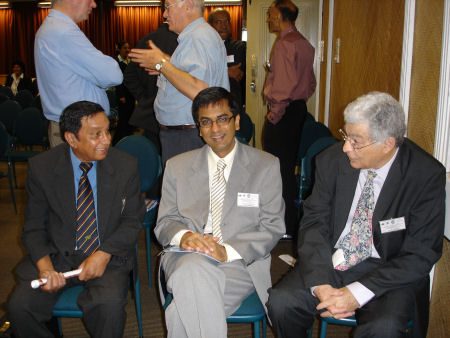 |
|
From left to right: Justice Govind, High Court of Fiji, Justice Chandrachud, High Court of Mumbai and Justice Chaskalson, Constitutional Court of South Africa (formerly Chief Justice) |
In addition to hearing commentaries on the papers by local judges, participants attended a number of sessions given by international experts on issues such as non-state actors and ESCR, the role of a national human rights institution in securing ESCR protection, the international legal framework and justiciability at the domestic level. These were complemented by a practical exercise on the right to health organised by the regional office of the OHCHR.
Throughout the three days of the event participants emphasised that there are a number of different national models for implementing ESCR and that the lack of constitutional entrenchment or domestic incorporation is not necessarily a bar to effective protection.
INTERIGHTS would like to thank the Commonwealth Secretariat, the Fiji Human Rights Commission, NZAID and the OHCHR for the funding gratefully received for the colloquium and workshop.
Landmark UN Human Rights Committee Decision Against Algeria (top)
On 30 March 2006 in the case of Saker v Algeria, Communication No. 992/2001, the UN Human Rights Committee found Algeria in breach of its obligations under the International Covenant on Civil and Political Rights with respect to Mr Saker, an Algerian teacher, who ‘disappeared’ following a forcible arrest without a warrant. He has subsequently been unlawfully held in an unknown place of detention and sentenced in secret. This is the first ever decision against Algeria adopted by the Committee. The Committee ordered the state of Algeria to conduct a full enquiry into Mr Saker’s disappearance, to release him immediately, inform his family of the results of the enquiry and to fully compensate him and his family. It also called on the state to punish those responsible for his disappearance and to prevent such actions in the future. The Committee found violations of the right to life, freedom from torture, inhuman and degrading treatment, liberty and security of the person and the right to an effective remedy. INTERIGHTS advised the local lawyer in submitting the case before the Committee and will be monitoring evidence of measures having been taken by the state within the 90 days prescribed by the Committee.
Read the summary of the judgment (in English) here and the full judgment (in French).
Uganda Training on Litigating Violence Against Women (top)
INTERIGHTS and FIDA (The Uganda Association of Women Lawyers) held a workshop in March 2006 for Ugandan lawyers on using international law and mechanisms to litigate violence against women cases. Violence against women is rife in Uganda, with many laws and legal practices themselves perpetuating violence against women and systemic gender-based discrimination. The 20 participants, all of whom are working on women’s rights cases before domestic courts, were engaged on how international and comparative jurisprudence might be invoked domestically, and how the UN Human Rights Committee and the African Commission might be used in instances where domestic protection fails. The workshop is the first in a series of litigation workshops that INTERIGHTS will hold in Uganda over the coming years. It was funded by the Sigrid Rausing Trust.
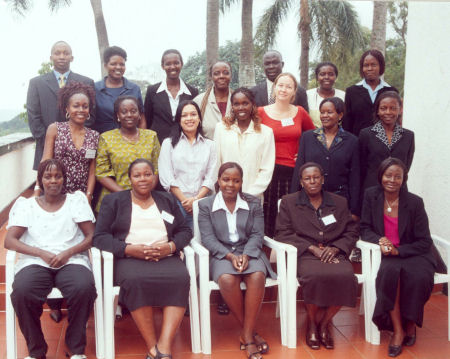 |
|
Participants and experts after the training session |
|
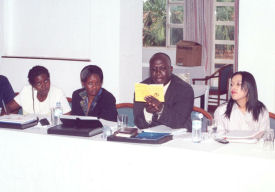 |
|
Third Session of Serbia and Montenegro Lawyers Training on the European Convention on Human Rights (top)
From 14 to 18 June 2006 , INTERIGHTS, in co-operation with Netherlands Helsinki Committee (NHC) and the Serbian Helsinki Committee on Human Rights (HCHRS), held the third session of its training programme on the European Convention on Human Rights (ECHR) for Serbian and Montenegrin lawyers. This session focused on the right to respect for private and family life and the prohibition of discrimination under the ECHR.
With respect to the right for private and family life, Elica Grdinic, lawyer at the Registry of the European Court of Human Rights, made a presentation on the standards applicable under the Convention. Marija Draskic, law professor at Belgrade University, reviewed the compatibility of Serbian law and practice with the Convention. Kevin Kitching, INTERIGHTS, discussed the Convention standards on the prohibition of discrimination. Tatijana Pavlovic-Krizanic, lawyer at DIA in Belgrade, followed with a discussion of the compatibility of Serbian law and practice with the Convention. Finally, Ivana Radacic, PhD student at University College London, drew participants’ attention to women’s rights issues under the ECHR.
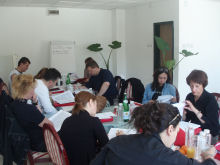 |
| Participants during the moot court session |
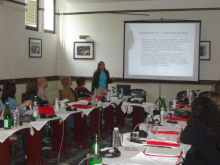 |
Tatijana Pavlovic-Krizanic giving a presentation on the compatibility of Article 14 ECHR with Serbian law |
As in the second training session, participants engaged in a three-day Moot Court workshop at the end of the session, during which they prepared an application to the Court and government submissions, applying the Court’s proportionality test covered in previous sessions.
After an interesting and successful session, participants are now looking forward to the next training session in September in Montenegro, that will focus on the right to freedom of religion, expression and assembly under the ECHR.
The training programme is funded by the Royal Netherlands Ministry of Foreign Affairs (MATRA), Open Society Institute ( Budapest) and supported by the Council of Europe.
If you would like to find out more about the session or inquire about future events, please contact INTERIGHTS’ Europe Programme Training Co-ordinator Jolanta Samuolyte at jsamuolyte@interights.org
Judgment on Termination of ‘Special Occupancy’ Rights (top)
The case involves the termination by the Croatian courts of the ‘special occupancy rights’ of the applicant during the conflict in the former Yugoslavia in the early 1990s. On 2 May 2005, INTERIGHTS submitted an amicus brief in the case of Blecic v Croatia before the Grand Chamber of the European Court of Human Rights. The brief requested the Court to review the appropriate margin of appreciation afforded to states in such cases and to reconsider the standard of review of state restrictions on rights protected by Article 8 of the European Convention on Human Rights. In its judgment of 8 March 2006, the Grand Chamber ruled the case inadmissible on the grounds of jurisdiction ratione temporis. The Chamber had previously declared that the case was admissible based on a Croatian Constitutional Court decision delivered after the date on which the Convention entered into force with respect to Croatia. The majority of the Grand Chamber, by contrast, considered that an earlier Croatian Supreme Court decision was the final domestic instance for the purposes of this case. In ruling the case inadmissible, the Grand Chamber did not address the substantive issues raised in the Chamber judgment or in INTERIGHTS ’ submissions.
Read the amicus brief here and access the full text of the judgment on the Court's website here.
European Court of Human Rights Declares Polish Abortion Case Admissible(top)
On 22 June 2006, Alicja Tysiąc received notification from the European Court of Human Rights of the admissibility of her case against the Government of Poland.
The case arose when Ms. Tysiąc was denied access to terminate a pregnancy that posed a serious threat to her health, even though such an exception is provided in Poland’s restrictive abortion law. Following the birth of her child, Ms. Tysiąc’s sight deteriorated significantly and she is now the near-blind mother of three children. The applicant submits that her right to a private life and her physical and moral integrity has been violated through the State’s failure to provide her with a legal therapeutic termination and also that it has failed in its positive obligation to provide comprehensive legal framework to guarantee her rights.
In a unanimous decision, the Court rejects the contention of the Government of Poland that Ms. Tysiąc’s application should be declared inadmissible on the basis that it was submitted later than six months after the refusal to termination of her pregnancy. Ms. Tysiąc had argued that she initiated criminal action against the doctor who refused to perform the termination, and that she had submitted her application to the European Court within six months of these proceedings. The Court accepted this for the purpose of the six-month rule, noting that ‘it is unclear what domestic remedies were available to be used in connection with the applicant’s Convention compliant arising from the refusal of an abortion and its consequences’.
The Government had also argued that Ms. Tysiąc had failed to exhaust domestic remedies, in that she did not initiate a civil suit for damages. Ms. Tysiąc noted, inter alia, that civil proceedings would not have provided an effective remedy in that there had not been a similar case decided favourably in a Polish court at the time in question. The European Court holds that the question of exhaustion of domestic remedies is closely linked to the substance of the applicant’s complaints, and should therefore be joined to the merits of the case.
In characterising the case, the Court observes that the applicant does not challenge the availability of abortion in Poland, or in the mere fact that she was refused an abortion on medical grounds. Rather, it is “grounded on a chain of events which was initiated by her fears that in her condition the third pregnancy and birth could negatively affect her vision.” Noting the substantive and procedural aspects of the case, the European Court concludes that the application “raises serious issues of fact and law under the Convention, the determination of which requires an examination of the merits”.
Background
Ms. Tysiąc suffered for many years from severe myopia. During her second pregnancy she was warned that pregnancy and delivery constituted a risk to her sight. When she discovered that she was pregnant for the third time, she consulted several ophthalmologists in Poland. The specialists concluded that there would be a serious risk to her eyesight if she delivered the child, but that this risk would be mitigated if she delivered by caesarean section. Each refused to refer her for a termination. A few days later, Ms. Tysiąc was issued with a referral for a termination by a general practitioner. However, when she approached the gynaecologist with the referral, he refused, and invalidated the referral. No process for review or appeal existed. Ms. Tysiąc was unable to access a lawful termination in time, and did not want to have an illegal abortion, so gave birth to her third child in November 2000. Weeks after the delivery, she suffered severe haemorrhaging of her eyes, and her sight deteriorated dramatically. She is now significantly disabled and requires daily assistance.
Ms. Tysiąc unsuccessfully initiated criminal proceedings against the gynaecologist. She was unable to effectively participate in the proceedings due to her failing sight, and the failure of the authorities to accommodate her disability.
INTERIGHTS are advisers to Polish counsel Monika Gasiorowska and Anna Wilkowska-Landowska in the case. The case is also being supported by the Polish Federation for Women and Family Planning.
The Tysiąc case provides a good opportunity for the Court to clarify the procedural obligations of States pursuant to the right to privacy and family life, namely the obligation of the authorities to ensure that women who are entitled to abortions under the law can access them in a timely fashion. It is hoped that the case will also lead the Polish state to take positive measures to address current concerns that practice regarding abortion in Poland is at odds with – and even stricter than - Polish law.
Read the full text of the European Court’s press release here: http://www.echr.coe.int
For more information please contact: Andrea Coomber, Acting Legal Director,: acoomber@interights.org
Vesselina Vandova, Legal Officer, Central and Eastern Europe Programme:
Release of Egyptian Scholar Detained on Religious Grounds (top)
In a case before the African Commission on Human and Peoples' Rights, INTERIGHTS acted as co-representative on behalf of Mr Metwalli, a Muslim scholar who was arbitrarily detained for almost three years for expressing a moderate interpretation of the Quran with respect to issues such as women and religious conversion. Mr Metwalli was detained under Egypt’s long-standing Emergency Law, the operation of which was challenged in the application submitted to the African Commission in its November 2005 session. The case concerned the rights to fair trial, freedom from arbitrary detention, freedom of religion, freedom of expression and equality. In April 2006, one month prior to the scheduled hearing of the case before the African Commission, INTERIGHTS is pleased to note that Mr Metwalli was released. INTERIGHTS represented Mr Metwalli with the Egyptian Initiative for Personal Rights, Cairo.
Sri Lanka Yet to Implement UN Human Rights Committee Ruling: INTERIGHTS Urges Sri Lankan Government to Comply (top)
The Human Rights Committee's decision in Singarasa v Sri Lanka, dated 23 August 2004, concerning human rights violations inflicted in Sri Lanka in the name of counter terrorism, represents a significant victory for the Applicant and his representatives, counsel Mr V.S. Ganesalingam, Attorney at Law and Director of the Sri Lankan NGO Home for Human Rights, and INTERIGHTS. The case focuses on the extraction of and reliance on 'confessions', and the necessary safeguards implicit in the right to a fair trial and protection from torture and inhuman treatment. Importantly, the Committee's findings
include that the onus is on the state � in other words, the prosecution in a criminal trial - to prove that a confession made in custody has been made without duress. Extracting confessions from individuals in circumstances which do not guarantee that they are freely and voluntarily rendered, and relying upon them as the sole basis for conviction, amounts to a violation of Article 14 (fair trial) together with Article 7 (freedom from torture or inhuman treatment) of the International Covenant on Civil and Political Rights (ICCPR).
Read a brief summary of the facts of the case, the lawyer's submission on behalf of the applicant, and the views of the Committee. Read a brief summary of the facts of the case, the lawyer's submission on behalf of the applicant, and the views of the Committee.
The decision was communicated to the Sri Lankan government on 4 August 2004 who then had 90 days to respond. This deadline has now expired with Mr Singarasa still in Kalutara prison and no indication from the government what action it has taken or intends to take to implement the Committee's decision. As a further measure, the local lawyer placed a petition before the Supreme Court of Sri Lanka on the extent to which the principle of legitimate expectation could be used in obliging the state to implement the Committee’s decisions. INTERIGHTS provided extensive advice on the petition, which was heard in mid December with the case adjourned for further deliberation in 2006. INTERIGHTS calls on the Sri Lankan government to comply fully with the decision and to communicate what steps it is taking to Mr Singarasa's family, his legal representatives and the Committee. Read INTERIGHTS' press release here.
Forthcoming Casebook on Economic, Social and Cultural Rights in South Asia (top)
INTERIGHTS and the Centre for the Study of Developing Societies (CSDS) in Delhi are currently working on the first casebook on regional developments in human rights law across South Asia. The Casebook will be invaluable for practitioners across the region and beyond. It aims to disseminate human rights information, to foster intra-regional dialogue on human rights law and to build capacity for comparative jurisprudence.
Contents include: Extracts from landmark judgments on economic, social and cultural rights of the apex courts of Bangladesh, India, Nepal, Pakistan and Sri Lanka; Reference to international and comparative human rights law and jurisprudence; Extracts of decisions of national human rights institutions; and extracts of academic articles and commentaries.
The Casebook focuses particularly on the intersection of human rights law and poverty, access to justice, effective litigation strategies and the rights of marginalised groups.
Compiled by an international team of human rights lawyers and academics, the Casebook will be ideal for use by lawyers, academics, activists and students of human rights law.